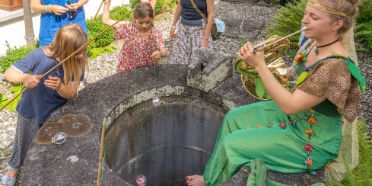Music in Context
Even the best art can have no impact if it does not find the right audience. This is why the HKB Music Division offers with its cluster Music in Context a specialization in artistic Musikvermittlung.
The offerings in this cluster:
- are open to all students in the Music Division.
- introduce you to the latest methods being used in teaching formats of varying complexity to equip you with skills in the field of Artistic Music Outreach,
- enable you to create concert dramaturgies and contexts that appeal to people of all ages and from different social and cultural backgrounds,
- convey background information on musicians working with unorthodox approaches,
- support you in undertaking collaborative projects involving other arts and non-musical partners, and help you with all aspects of organizing participatory artistic projects – from financing to implementation,
- prepare you for a career in freelance music outreach, or to apply for a position in the field of cultural outreach in orchestras or festivals.
Teaching formats
If you would like to gain skills in music outreach (Music in Context) during your studies at HKB, you can choose between the following offerings:

Specialization in Music in Context as part of the MA Specialized Music Performance (4 semesters)
Content
In the specialization Music in Context participants carry out their own performative project that addresses at least one specific group in society. They also plan transdisciplinary experiments and actions and try out concert formats. On national and international excursions they gain deeper insights into best practice in performative Musikvermittlung and organising progressive concert events. For their final project, they freely conceive their own performance, calling on the assistance of two external mentors. In parallel, they draft a business plan for a participatory project.
Director: Barbara Balba Weber
ECTS credits: 20
Structure
- Individual lessons: 45’ per week (or in blocks)
- Group lessons: 5 x 3 hours per semester
- Conception and implementation of a specific action of an experimental nature
- Research Toolbox for the semester focus
- Project management: 2 block days in spring semester and self-study
- Optional course: “Salon and cellar concerts” (in autumn semester)
- Optional course: “New concert formats” (in spring semester)
- Excursions: 2 group and 2 independent excursions
Minor Music in Context (2 semesters)
Content
The two-semester minor is suitable for students from all degree programmes in music who are interested in the social and interdisciplinary aspects of music. In private lessons they conceive their own performative project for at least one specific group in society. If desired, this can be combined with other ongoing projects such as a master’s thesis or the founding of an ensemble. There is also an opportunity to take part in national and international excursions. The final project is to draft a concept for a project that can potentially be sold to festivals, concert promoters and/or various other institutions or can be carried out independently.
Director: Barbara Balba Weber
ECTS credits: 20
Structure
- Individual lessons: 45’ per week (or in blocks)
- Group lessons: 5 x 3 hours per semester
- Conception and implementation of a specific action of an experimental nature
- Research Toolbox for the semester focus
- Project management: 2 block days in spring semester and self-study
- Optional course: “Salon and cellar concerts” (in autumn semester)
- Optional course: “New concert formats” (in spring semester)
- Group or independent excursion in agreement with the cluster head
Optional courses for students from all divisions:
Semester focus on groups in society
In a 3-year cycle, each semester focuses on one of the following groups in society:
- Young adults
- People with disabilities
- Senior citizens
- Migrants
- Rural communities
- Elites
Y-Research Toolbox for the semester focus
Based on a specific theme, students from any division at HKB achieve insights into the fundamentals of artistic research. At the centre is their own experiment carried out as modern field research using approaches from the areas of ethnology, sociology and cultural studies. We study, observe and listen to a different group in society each semester, responding through our own artistic means. The results – performances, installations, and project and action concepts – are then presented to a wider public on the focus day.
Lecturers: Barbara Balba Weber and guests
ECTS credits: 2
Autumn semester: week 46
Spring semester: week 16
Optional course: “Salon and cellar concerts”
Progressive event concepts in mini-format: As a counter-movement to globalisation and digitalisation, we experiment with concerts in private spaces. This is our response to the megatrend known as relocalisation. The concerts refocus our attention on what is immediately physical, local, home-made, private and small-scale. Together we develop interdisciplinary concepts and experiment with music, light, communication, and musical involvement by the audience and the hosts.
Optional course: “New concert formats”
Participants in this course acquire the skills to find their own way in the world of music and to deal with the variety of modern concert formats that have emerged in the last two decades. Today, every orchestra and event organiser has something special to offer, from dark, recumbent and brunch concerts to senior citizen, late-night and family concerts all the way to concerts that are immersive, those where you listen twice, and ones you get involved in. So it’s high time to start studying these formats in order to try them out and come up with fresh ideas for the future!

